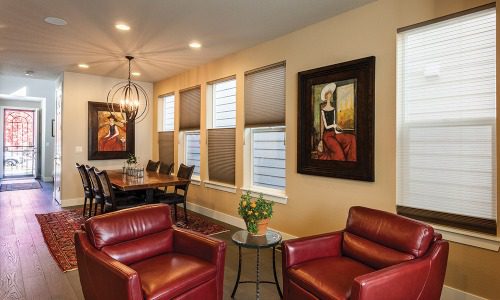The future of the smart home is all about customization. Beyond demand for seamless systems and devices and scenes designed to suit their unique lifestyle, homeowners want attractive, practical design features.
To capture the changing smart home demand, dealers are expanding their product repertoire with control systems, audio brands, smart thermostat products, and voice assistants.
Automated shading, then, feels like the next natural expansion. New data shows that as homeowners emphasize aesthetics, smart shade adoption will grow steadily over the next decade, but limited smart shade colors, styles, and integration options are preventing dealers from capturing the opportunity.
AV and smart home integration firm ListenUp serves the Colorado and New Mexico market, installing a range of lighting control, automation, home theater, audio, and other systems for typical one-room systems, small businesses, and up to multimillion-dollar home projects. They take a custom approach, finding the right products and brands for each project from a suite of options including Control4, Crestron, Savant, Universal Remote Control, and more.
Even with the numerous home entertainment and control choices, the company had limited shading color and size options, which prevented their team from offering products to suit all of their customers and left revenue opportunities on the table.
Benjamin Larkin, executive vice president of operations at ListenUp, was early in identifying their product offering gap. “Window coverings were rejected by our customers because of price, and the lack of selection and design capabilities.”
Homeowners have high expectations and design requirements for their window treatments. ListenUp was losing the smart shading opportunity in projects because their customers didn’t want just a smart shade; they still wanted beautiful fabrics and styles that would suit their décor, as well as room darkening technology and more granular automation.
“Selling to homeowners from the top one-percent and ultra-luxury market to the average one-room project and everything in-between, we were losing projects because we simply didn’t have the right products,” explains Larkin.
While they offered smart shading, ListenUp’s customers were hesitant to add it to projects due to the design limitations and lack of selection. To make the category more viable for middle-market to luxury homeowners, they needed window coverings that could be customized to suit any décor and window size.
Removing the Risk of Overhead
The company took a new direction to expand its smart shade offering, going beyond the technology industry and choosing window treatment manufacturer Hunter Douglas, which has the sizes, colors, and fabrics to suit any customer’s design needs, plus a platform to work with most smart homes.
The ListenUp team joined forces with Hunter Douglas, taking on their full shading line, training several staff members on measuring, styles, integration practices, and more. Hunter Douglas PowerView Motorization was designed for the smart home and enabled easy onboarding for ListenUp. It has an intuitive user interface on the app and the Pebble Remote Control, as well as the ability to be added into scenes and schedules through compatibility with Apple HomeKit, Control4, Crestron, Elan, IFTTT, Logitech Harmony Home, Universal Remote Control, RTI, and Savant, as well as Amazon Alexa and the Google Assistant.
ListenUp was also able to easily integrate Hunter Douglas’ automated window treatments to many of its projects. When involved in a project, an HDIS professional handles everything from the measuring through installation, including feedback about window requirements, specialty parts, and missing pieces.
“It removes the risk and the overhead, and I don’t have to cross-train my existing staff in installing 89 flavors of Hunter Douglas window coverings,” says Larkin.
“Success builds on success. We got behind the product and motivated our people.”
Collaborating With Designers, Expanding Shading Options
The team established a new approach to introduce their new product line, showing smart shades within a smart home in their showrooms, collaborating with designers, and giving window treatment quotes upfront.
After piloting the integrator collaboration with ListenUp, Hunter Douglas recognized the value of CEDIA dealers, introducing its Custom Integrator Program (CIP) to smooth the path for dealers to add shades to any smart home, theater, or whole-home project.
The program is designed to make adding automated shades more palatable for the average CEDIA dealer’s business model, providing sales and installer training, presentation tools, access to the full Hunter Douglas custom window treatment line, and other resources.
Steven Weiner, senior vice president of ListenUp, was delightfully surprised with the results of adding shading options to its repertoire.
“I thought Ben was crazy because window coverings were just a small part of our business, but their product lineup expanded our offerings far beyond what we were able to offer before,” says Weiner.
Now, ListenUp has automated shade solutions for their full client base plus new clients. In addition to smart window treatments, the company could also offer traditional shades as a hybrid so homeowners could have uniformity across their “dumb” and automated shades, and slowly upgrade their home over time. It’s also gotten them in the door with new customers who seek the security, comfort, convenience, and energy savings of automated shades.







